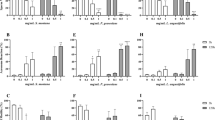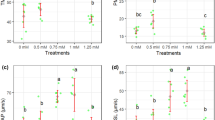Abstract
THE detrimental effect of ethylene dibromide (EDB) on laying hens has been described previously1–3. An assumption was made that EDB affects the formation or release of the follicle stimulating hormone from the pituitary2, or the neuro-humoral control of the growth and shedding of ova3.
This is a preview of subscription content, access via your institution
Access options
Subscribe to this journal
Receive 51 print issues and online access
$199.00 per year
only $3.90 per issue
Buy this article
- Purchase on Springer Link
- Instant access to full article PDF
Prices may be subject to local taxes which are calculated during checkout
Similar content being viewed by others
References
Bondi, A., Olomucki, Eugenia, and Calderon, M., J. Sci. Fd. Agric., 6, 600 (1955).
Olomucki, Eugenia, Nature, 180, 1358 (1957).
Fuller, H. L., and Morris, G. K., Poult. Sci., 41, 645 (1962).
Bondi, A., and Alumot, Eugenia, first Annual Report to U.S. Dept. Agric., Research Grant FG–Is–117 (1962).
Author information
Authors and Affiliations
Rights and permissions
About this article
Cite this article
AMIR, D., VOLCANI, R. Effect of Dietary Ethylene Dibromide on Bull Semen. Nature 206, 99–100 (1965). https://doi.org/10.1038/206099a0
Issue Date:
DOI: https://doi.org/10.1038/206099a0
Comments
By submitting a comment you agree to abide by our Terms and Community Guidelines. If you find something abusive or that does not comply with our terms or guidelines please flag it as inappropriate.



